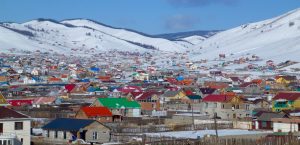Like most of Asia, especially China’s direct neighbors, Mongolia has watched the ongoing outbreak of a new coronavirus (now called COVID-19) with concern. Early this week, the Mongolian State Emergency Commission announced the suspension of the annual celebration of the Mongolian Lunar New Year (called Tsagaan Sar), adding to existing preventative measures taken by the state since the start of the outbreak, which originated in the Chinese city of Wuhan, early this year.
The situation in China remains dire, with the death toll rising and confirmed cases surpassing 44,000. There are no confirmed cases in Mongolia at present, but the country is considered to be at high risk.
In late January, Mongolia banned public gatherings and shut its border with China out of concern that the coronavirus could enter the country. Schools and universities were also suspended through March 2. The Mongolian government is particularly concerned due to the fact that the capital city is home to more than a million people, about a third of the country’s entire population.
Mongolia was set to celebrate its traditional new year on February 24.
The Lunar New Year is an important event for Mongolians, touching on traditional values held dear, especially by the older generation. Marking the new year is a deeply held tradition, and its celebration has always trumped difficult economic or political circumstances. The core of the celebration is family, though colleagues, peers, and friends also gather to perform traditional rituals as a form of “team building” and integration during the Lunar New Year. However, the rituals embedded in this traditional holiday are likely to beget risks of spreading the coronavirus and other respiratory diseases as they include close human interaction, such as kissing and hugging.
Due to this risk, the Mongolian government suspended the traditional celebration.
Interestingly, the state’s decision to ban gatherings and the typical Lunar New Year celebrations has been welcomed by the masses. The highest ranked commercial television network in the country, Mongol HD Television, carried out a survey on its Facebook page last week on suspending the Lunar New Year celebration this year to prevent the spread of the new coronavirus. More than 70,00 active Facebook users participated in the online survey and 86 percent supported the decision to suspend celebrations out of an abundance of caution regarding the spread of the coronavirus. Most of the participants highlighted that the extended celebration of the Lunar New Year in China worsened the spread of the coronavirus there.
In Ulaanbaatar, the capital city of Mongolia, public fears related to the coronavirus outbreak remains strong. Face masks and hand sanitizer are in high demand. Currently, the Ministry of Health of Mongolia has purchased $1.6 million worth of medical supplies and equipment in the interest of prevention. Moreover, as school and university classes are suspended, online courses for students have been organized through early March to prevent an educational gap.
Tergel Bold-erdene is an assistant lecturer at the School of International Relations and Public Administration, National University of Mongolia.

































